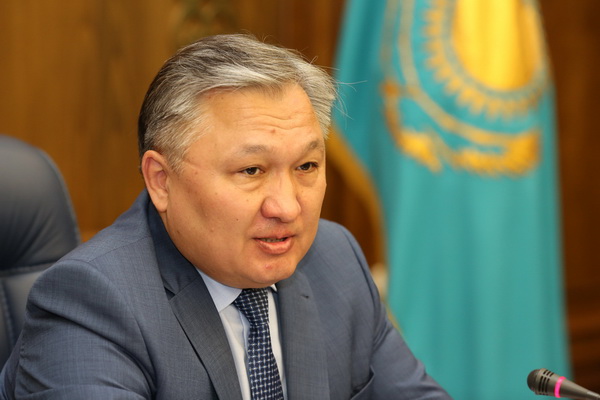Chairman of the Accounts Committee for Supervision over the Execution of the Government Budget Nurmukhambet ABDIBEKOV:
WE HAVE CARRIED OUT FOR THE FIRST TIME THE BUDGET RISK ASSESSMENT FOR THE NEXT THREE YEARS

The Accounts Committee for Supervision over the Execution of the Government Budget has carried out this year for the first time the assessment of the new three-year budget and revealed the risks affecting the economic growth factors. Also, the Accounts Committee has conducted audits in the regions this year and revealed a number of systemic shortcomings. Nurmukhambet ABDIBEKOV, the commmittee chairman, talked about these problems and their solution, as well as about the change of the Accounts Committee benchmarks in an interview with Interfax-Kazakhstan.
- How big are the 2018-20 government budget risks?
- This year for the first time we have assessed the draft Law on the Government Budget for 2018-20 in terms of the main areas of its expenditures and noted the risks affecting the economic growth factors and the country's economic development scenarios that had not been taken into consideration at the time of compiling the budget.
Budget planning prevails over strategic planning because draft strategic plans, budget programs and applications are submitted for consideration and approval in parallel according to deadlines.
To eliminate this imbalance it is necessary to distinguish more clearly the stages of planning draft strategic plans and considering budget applications.
The budgetary process shortcomings may affect the formation of the volume of expenditures on the implementation of projects and program documents, coherence and consistency of the taken decisions.
Cost planning is based on forecasts of the budget revenue whereas we believe that the potential of the regions was not fully taken into account.
- Did the Accounts Committee propose measures to reduce risks?
- Yes, we have devised normative-methodological and organizational recommendations. Their implementation will make it possible to better ensure the completeness and reliability of information on the state of public finances and their forecasting.
For example, we recommended that the government set out more precise criteria for classifying projects as especially important in the program documents and requiring operational implementation. It is also recommended that investment expenditures be backed with a concrete list of projects with regard to the regions and programs, and practice of financing projects with missing designs on fair-away terms be ruled out.
In general, the budget is focused on fulfiling the program documents objectives in the medium term, but reserves have been identified for enhancing the quality of budget planning, achieving the maximum economic effect from invested resources. Let me note that a significant part of our recommendations were taken into account by the government as part of the December [2017] amendments to the Budget Code.
When approving the budget, the oil price of $ 45 per barrel and the exchange rate of 340 tenge for $1 have been set out as a basic scenario for further planning and forecasting the preformance of state and business entities.
In world practice, countries that are oriented to raw materials exports, in conditions of high price volatility, put down prices below market prices in the budget in order to exclude the risks of shortfall in the budget revenues and to prevent the budget expenditure sequestration when it is executed. Therefore, the government budget is calculated given optimal indicators of the economic development basic scenario
When assessing preliminarily the draft budget we drew attention to the lack of analysis of the consequences of optimistic and pessimistic economic scenarios for Kazakhstan's public finances. We recommended that the government analyze macro-indicators and budget parameters under all scenarios with introduction of monitoring of the attainability of the projected parameters in order to identify negative trends in the country's socio-economic development.
The amount of the guaranteed transfer from the National Fund to the national budget is reduced to 2 trillion tenge (332.33 tenge/$1) by 2020, which fully corresponds to the Concept of the National Fund formation and use.
The Accounts Committee proposed to take measures to prevent an increase in oil and non-oil shortages, as well as transfers from the National Fund in the course of adjusting the government budget with their planned reduction in the corresponding laws on the republican budget in order to maintain positive dynamics.
- What gives Kazakhstan the transfer of the Accounts Committee from control-supervisory to audit functions? Will obligatory receipt of the auditor certificate change the situation in the audit market?
- Transition to state auditing has changed benchmarks - from detecting violations to the analysis of the causes of weak fiscal discipline. This will make it possible to regard the supervisory authorities not as a punitive tool, but to see them, in some sense, as partners who pursue one goal - to prevent inefficient and unreasonable use of funds and enhance the quality of strategic goals to be achieved.
Based on the results of audit and expert-analytical activities, the Accounts Committee works out proposals for improving laws, optimizing management processes and organizing the activities of state bodies and the quasi-public sector’s entities.
The activities of the Accounts Committee and the regional audit commissions are switched from current operational supervision to expert-analytical activities and efficiency auditing.
Audit targets are selected using a risk management system. So, the state audit bodies pinpoint areas where the probability of unjustified legal and economic decisions is high preventing possible negative consequences.
Since 2016, state auditors have been certified. As of December 25, 2017, 1,366 state auditors were certified. In addition, 58 employees of the Accounts Committee, Audit Commissions, and Ministries of National Economy and Finance received the CIPFA Public Auditor’sinternational qualification certificates.
The responsibility of administrators of budget programs for non-compliance with the requirements of the law remains. The state audit authority has levers of influence on the violators of budgetary discipline - the initiation of administrative proceedings, filing a lawsuit in court, sending materials with signs of criminal offences to the law enforcement bodies.
- And what about the regional finances? In Kazakhstan, there are regions – debtors indebted to the state or second tier banks? How best do the regions plan their loans?
- The audit of the use of local budget funds is within the remit of the audit commissions. The Accounts Committee audits the use of transfers from the national budget allocated for the regions.
This year we have applied audit to [Kazakhstan’s] five regions and identified a number of systemic shortcomings that are common in all of the regions. There is no proper interaction with the central state bodies, continuity in earlier taken decisions on the implementation of investment projects, their co-financing from the local budget, efforts to find additional sources for the regional development are insufficient , including through public-private partnership tools.
- What is the money circulation scheme between the center and the regions like? What percentage of income do the regions send to the center these days? Are the regions financially independent?
- The analysis of the efficiency of the use of budget funds by regions was done in the Accounts Committee report on the execution of the government budget for 2016,
Budgetary contributions to the government budget are made by the four regions (Astana, Almaty, Atyrau and Mangistau regions). The Astana contribution increments amounted to 130.9%, Mangistau region to 53.7%, Atyrau region to 20.6%, Almaty to 16.8%.
The share of transfers in the local budget incomes is on the rise. It increased by 2.3% to an average of 56.6% in 2016 compared to 2015,
It is too early to talk about the situation that emerged in 2017 but the dynamics in recent years have shown the ongoing tendency to dependency of regional incomes on national transfers.
Therefore, in our opinion, the regions need to use the existing potential for creating revenue to local budgets more efficiently, including by increasing the taxation and investment attractiveness efficiency.
- Will spending on health, education, infrastructure not increase again in 2018? In your opinion, is the structure of budget expenditures optimal?
- The structure of the budget is determined by the emerging socio-economic situation. In addition, Parliament discusses the draft and passes the budget in optimal parameters, including the structure of expenditures.
The state's commitments to citizens, including in health care, education, social security are not reduced, but tend to increase.
Reduction in funding in certain areas is usually associated either with the completion of large projects or with finding additional sources of funding, for example, through public-private partnership instruments.
- Is there a long-term strategy that could help pull the self-employed out of the shadow [economy] now in Kazakhstan?
- Not the self-employed, but the unproductive self-employed are the problem for the economy. This problem is set out in the Program for the Development of Productive Employment and Mass Entrepreneurship for 2017-21. The share of the unproductive [self-employed] in the make-up of the self-employed population is to be reduced from 15% to 10% in 2017 to 2021. It is supposed to promote employment of the unemployed and self-employed by creating social jobs funded from the government and local budgets.
There has been a tendency to reduce the level of unproductive employment - from 2013 to 2016 the number of the unproductive self-employed decreased from 1.011 million to 301,000 people, according to statistics.
- Thank you for the interview!
December, 2017
© 2025 Interfax-Kazakhstan news agency
Copying and use of these materials without reference to the source is prohibited
Archive






